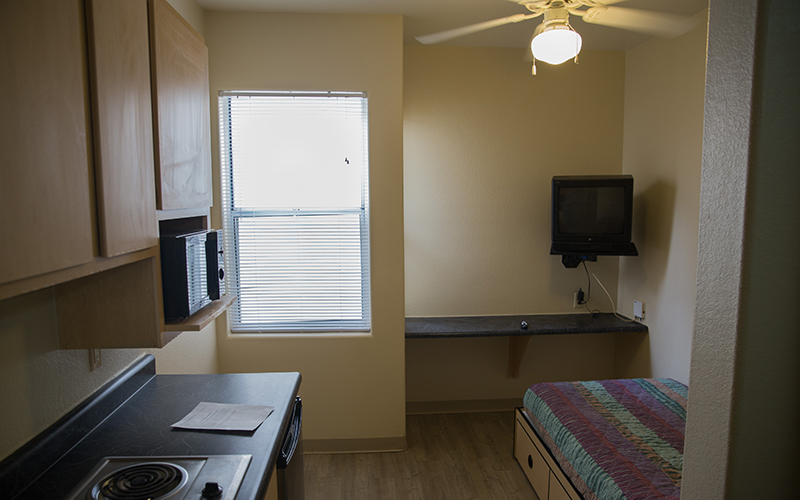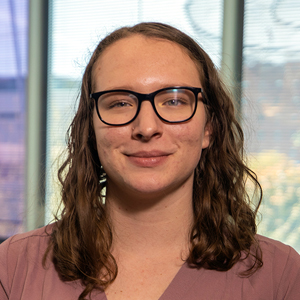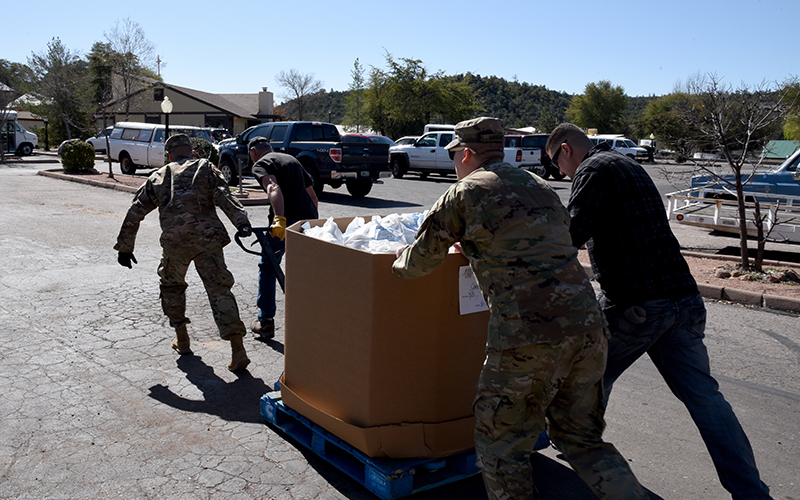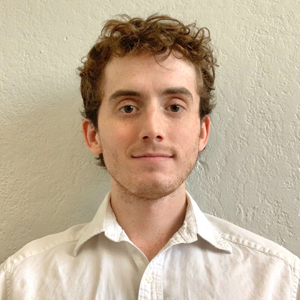
The Arizona Housing Inc. property at 209 W. Jackson in Phoenix has rooms for single adults and numerous onsite support like behavioral health services and peer counseling. They hope to use grant money from the Arizona Housing Fund to work on similar future projects. (Photo by Michael Hannan/Cronkite News)
PHOENIX – Fears of winding up on the streets are on the rise as more Arizonans lose their jobs due to the COVID-19 outbreak, but a fund has been set up to help local nonprofits build housing with access to onsite support services for low-income people.
On March 24, Gov. Doug Ducey issued an executive order to delay evictions for renters impacted by COVID-19 through quarantine or job loss. The order will remain in effect until late July, but many Arizonans likely still will face difficulties if they can’t continue working until then or have to catch up on any missed rent.
For the week ending April 4, the Arizona Department of Economic Security reported that 129,215 people filed for unemployment, jumping from 88,688 the week before.
The Arizona Housing Fund, a sustainable source of money for nonprofits that build permanent housing for low-income Arizonans, may be a solution to the possible rise in homelessness.
“Right now, every nonprofit, charity or community effort that focuses on something unrelated to COVID-19 is rightfully taking a backseat to all things battling this pandemic,” the fund’s creator, Howard Epstein, said in an email. “Unfortunately, the aftermath and recovery from this very difficult time will cause more homelessness and housing issues, making the AZHF even more necessary and important for years to come.”
In 2019, 6,614 people experienced homelessness just in Maricopa County. A little less than half were unsheltered and a majority were adults. The other half were sheltered in transitional housing, emergency shelters or safe haven programs according to the Maricopa Association of Governments 2019 homelessness Point-in-Time count report.
The fund was created last summer by several Realtors and homebuilders, including Meritage Homes. Epstein said most donations from individuals come through the Arizona Community Foundation website.
Other donations come in through the fund’s escrow donation program. In Arizona, an escrow company, also known as a title company, is a third party company that typically handles the closing when buying, selling or refinancing a house.
During each transaction, every individual involved – including the escrow company and Realtors – is asked whether they want to donate money to the fund. A single transaction could net $200 or more for the fund, Epstein said.
“Another interesting way that we’re raising money is in the apartment community,” he said. “Some have already rolled it out, but the apartment owners are talking about everytime there is an application fee … they’re going to commit $5 for every application fee to the Arizona Housing Fund.”
Only nonprofits that own and operate permanent, low-income housing with support services can apply to the fund, Epstein said, and they must provide a detailed application that shows how new projects will be sustainable. Support services are tailored to each individual resident and can include helping them get prescriptions and schedule appointments with a doctor.
“It’s specifically for bringing new inventory to the market. It’s not remodeling an existing project,” Epstein said. “It’s narrowly focused on those things, with special emphasis on those projects that will help the most vulnerable.”
The Arizona Housing Inc. is one of the nonprofit partners with the housing fund. The corporation was established in 1995 to provide “permanent, affordable supportive housing for the homeless” according to its website.
CEO Mark Holleran said it’s important for the private sector to partner with nonprofits to help end homelessness, adding that such partnerships can open doors that previously were closed for nonprofits.
“I told people, ‘We don’t need to reinvent the wheel here,'” Holleran said. The private sector is “at the table right now. They’re building units and they’re affordable if you want to pay 1500 bucks a month and up, and they’re building them like there’s no tomorrow. What’s it going to take to get them to build the type of units that we’re dealing with? There’s the magic.”
The Arizona Association of Realtors is communicating with its 53,000 members to promote the housing fund, according to the CEO Michelle Lind, who also is on the housing fund’s advisory committee.
“When the Arizona Housing Fund presented itself to us, we saw an opportunity to help people go from living on the street to living in a home. That’s what Realtors are all about,” Lind said. “We really believe that Realtors can be key in a team effort with buyers and sellers … and others in the real estate community to effectuate change.”
The main challenge the fund faces, she said, is communicating and educating buyers and sellers on the opportunity to donate to it.
“Arizona has always been a real leader in the real estate industry nationwide,” Lind said. “I am sure that if this is a success, other states will see this as a success and be able to implement it in their states as well. And wouldn’t that be wonderful if we could get nationwide effort to build and operate permanent supportive housing for those in need?”


